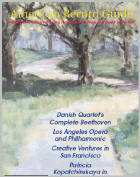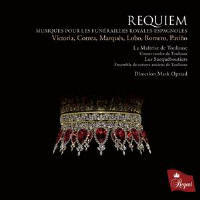Texte paru dans: / Appeared in:
|
|
|
Outil de traduction ~ (Très approximatif) |
|
|
Reviewer: Charles
Brewer Since 1988, 17 recordings of Tomas Luis de Victoria’s Officium Defunctorum have been reviewed in ARG, and it has formed part of the standard repertoire for any vocal early music ensemble. Some have been a cappella (S/O 1988 & J/A 2018) and others have added instruments (S/O 1996 & 2003), and the voices have been either all male (S/O 1996) or various groupings of mixed voices. Among all these earlier recordings there is really only one ensemble that is comparable to La Maitrise de Toulouse: the Westminster Cathedral Choir (S/O 1988). Both include the voices of children (though La Maitrise includes both boys and girls). In past reviews of earlier recordings (such as N/D 2011), I have expressed my preference for the quality and interpretation of the Westminster Cathedral singers. There a number of ways that Mark Opstad has crafted an interpretation that equals the austerity and sincerity of David Hill. The only significant difference is that the voices on this new release are sometimes doubled by the musicians (or shall we say ministriles) of Les Sacqueboutiers. There are a number of reasons for the appropriateness of Opstad’s decisions. There is documentation from the Convent of las Descalzas Reales, when funerals were performed there for members of the royal family or other nobility, that the professional singers and instrumentalists already attached to the convent were augmented by their colleagues in the royal chapel. There are later reports, such as one written in 1666 by a French traveller, Jean Muret, that the Spanish “bury them to the sound of instruments and with musical concerts to which everyone is invited as if to a party”.
| |
|
|
|
|
Cliquez l'un ou l'autre
bouton pour découvrir bien d'autres critiques de CD |
|




